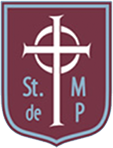Science
Intent
St Martin de Porres Catholic Primary School recognises and values the importance of Science and scientific enquiry.
We aim to develop a fun, practical and engaging high-quality curriculum that inspires the next generation to succeed and excel in Science. We do this through fully adhering to the aims of the national curriculum and fostering a healthy curiosity and interest in the sciences. It will encourage respect for living organisms and for the natural environment.
At the heart of our progressive science curriculum is scientific investigation. Wherever possible we intend to deliver lessons where children learn through varied systematic investigations, leading to them being equipped for life to ask and answer scientific questions about the world around them.
We believe science encompasses the acquisition of knowledge, concepts, skills and positive attitudes. Throughout the programmes of study, the children will acquire and develop the key knowledge that has been identified within each unit and across each year group, as well as the application of scientific skills.
We ensure that the Working Scientifically skills are built-on and developed throughout children’s time at the school so that they can apply their knowledge of science when: using equipment; conducting experiments and investigation; building arguments and explaining concepts confidently; being familiar with scientific terminology and; most importantly, to continue to ask questions and be curious about their surroundings. They will be immersed in key scientific vocabulary, which supports in the acquisition of scientific knowledge and understanding.
Implementation
The acquisition of key scientific knowledge is an integral part of our science lessons
The progression of skills for working scientifically are developed through the year groups and scientific enquiry skills are of key importance within lessons.
At St Martin de Porres, teachers create a positive attitude to science learning within their classrooms and reinforce an expectation that all children are capable of achieving high standards in science.
Our whole school approach to the teaching and learning of science involves the following;
- Science will be taught in planned, and arranged, topic blocks by the class teacher. It is taught weekly.
- Our strategy is to enable all children to be catered for through adapted planning suited to their abilities.
- We plan for problem solving and real life opportunities that enable children to find out for themselves.
- Children are encouraged to ask their own questions and be given opportunities to use their scientific skills and research to discover the answers. This curiosity is celebrated within the classroom. Planning involves teachers creating practical, engaging lessons with opportunities for precise questioning in class to test conceptual knowledge and skills, and assess children regularly to identify those children with gaps in learning.
- Our curriculum is progressive. We build upon the learning and skill development of the previous years. Before they embark on a new unit, children are asked to complete target questions based on learning from previous years and enter any knowledge they have about the upcoming unit. This way the teacher can address gaps and ensure that knowledge and understanding is joined up.
- At the end of the unit, the children go back to these target questions and add to them with their new learning. The teacher will then review the answers as a whole class to ensure all misconceptions and gaps are dealt with.
- Working Scientifically skills are embedded into lessons to ensure these skills are being developed throughout the children’s school career, and new vocabulary and challenging concepts are introduced through direct teaching. This is developed through the years, in keeping with the topics. Teachers demonstrate how to use scientific equipment, and the various Working Scientifically skills in order to embed scientific understanding.
- Through enrichment days, such as ‘science week’, we promote the profile of Science and allow time for the children to freely explore scientific topics.
- Children have access to the school garden and outside forest area to enhance their knowledge, understanding and experience of the outside world.
Impact
The successful approach to the teaching of Science at St Martin de Porres results in a fun, engaging, high quality science education, that provides children with the foundations for understanding the world that they can take with them once they complete their primary education.
Assessment is through weekly ‘5 a day’ recaps and end of unit informal assessments. During lessons, there will be ample opportunities for children to show their understanding a variety of ways including diagrams, concept maps, verbal/written presentations and reflection tasks.
So much of science lends itself to outdoor learning, and so we provide children with opportunities to experience this. Children learn the possibilities for careers in science as a result of our community links and enrichment activities during ‘Science Week’. Pupil voice is used to further develop the Science curriculum, through questioning of pupils’ views and attitudes towards Science, to assess the children’s enjoyment of science, and to motivate learners.
Children at St Martin de Porres will:
- demonstrate a love of science work and an interest in further study and work in this field
- retain knowledge that is pertinent to Science with a real life context.
- be able to question ideas and reflect on knowledge.
- be able to articulate their understanding of scientific concepts and be able to reason scientifically using rich language linked to science.
- demonstrate a high love of mathematical skills through their work, organising, recording and interpreting results.
- work collaboratively and practically to investigate and experiment.
 St Martin de Porres
St Martin de Porres 


